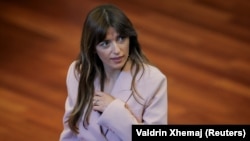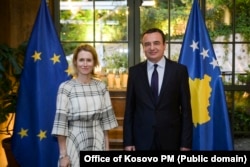Opposition politician Hykmete Bajrami reminded Kosovo’s lawmakers of Einstein’s alleged description of insanity -- doing the same thing over and over and expecting a different outcome -- after an early attempt to elect a house speaker failed.
A month later, and after a total of 21 failed attempts to move forward in the process of forming a government following February elections, many in Kosovo are wondering if Bajrami is on to something.
A political stalemate with the opposition over Prime Minister Albin Kurti’s choice for speaker, Albulena Haxhiu -- neither side has budged so far -- is making it impossible to put parliament’s leadership in place to allow the formation of a government at a time when the country is looking to make progress on its path to European Union membership.
“The institutional crisis that followed the elections of February 9, 2025, has crossed every tolerable limit and is damaging not only the Assembly, but also the functioning of the entire democratic and institutional system of the country,” a group of civil society organizations warned before the latest failure in the house over the weekend.
Kurti’s party won 48 seats in the February elections. While he has the support of some deputies from Kosovo's minority groups -- excluding the Serb community -- their combined backing still falls short of the 61-seat majority required to elect a speaker and form a government.
Haxhiu, who served as a justice minister and senior figure in Kurti’s Vetevendosje (VV) party, is viewed by opposition parties as a divisive choice. Her repeated failure to garner the required votes in the 120-seat assembly has also raised broader questions about Kurti’s capacity to form a governing coalition.
Political parties that were in opposition during the last parliament, such as the Democratic Party of Kosovo (PDK) and the Alliance for the Future of Kosovo (AAK), have urged Albin Kurti to nominate a more broadly acceptable candidate for speaker, but he has refused to compromise.
Confrontational Rhetoric
Their resistance has been further reinforced by what they describe as Kurti’s confrontational rhetoric during the election campaign, deepening their reluctance to cooperate with him -- even in the context of a potential future coalition.
The Democratic League of Kosovo (LDK) has stated it will not support any speaker candidate proposed by Vetevendosje and has rejected Kurti’s offer to join a governing coalition. Instead it proposed a transitional government composed of all ethnic Albanian parties, which represent the majority population in Kosovo. This proposal was rejected by Vetevendosje.
In a bid to break the impasse after the seventh vote failed, lawmakers have been voting on a proposal to form a commission to oversee a secret ballot for the speaker vote. But that proposal, too, has been repeatedly rejected by deputies, including in the weekend vote.
Under Kosovo’s legal framework, the inaugural session of parliament must be reconvened every 48 hours until a speaker is elected. There is no legal time limit for how long this can continue. The next vote is slated for May 27.
Adrian Shtuni, a Washington-based foreign policy and security expert, says Kosovo's ongoing institutional paralysis is not merely a result of political polarization but a deeper failure to articulate a shared strategic vision for the country’s future.
In an interview with RFE/RL's Kosovo Service, he described the situation as a “mutual zugzwang,” where any political move is seen as a risk, and no actor is willing to compromise.
“More specifically, the reasons for the delay are because no one has the minimum 61 votes, and also no one has a real will to compromise or sufficient trust in potential coalition partners,” Shtuni said.
Critical Period
The failure comes at a critical time for Kosovo, one of Europe’s poorest countries.
Ambassadors from the Quint countries -- the United States, the United Kingdom, Germany, France, and Italy -- have warned Kurti over the political deadlock and have urged the swift formation of a stable and functional government -- essential, they emphasized, for unlocking frozen funds, addressing key domestic and international priorities, and advancing Kosovo’s path toward Euro-Atlantic integration.
The EU's foreign policy chief, Kaja Kallas, last week called for all of Kosovo’s political parties to come together and cooperate.
During a visit to the country, she announced the easing of sanctions imposed on Kosovo over its role in heightening tensions in the Serb-dominated north.
But further progress is needed if Kosovo is to take advantage of the bloc's 6 billion euro ($6.8 billion) Growth Plan for the Western Balkans.
"For that to happen, Kosovo needs functioning institutions that can effectively implement reforms, and that's why I encourage all parties to break the political stalemates and swiftly form a government," she said.
Some analysts put the blame for Kosovo’s political deadlock primarily on Vetevendosje, which, despite winning the election, has insisted on a speaker candidate who lacks broad support.
They say that, even if Kurti eventually wins this battle, any government to emerge from the crisis is likely to be unstable.
Dr. Gezim Visoka, professor of Peace and Conflict Studies at Dublin City University in Ireland, said the current political paralysis in Kosovo should serve as an incentive to rethink and rebuild the country’s political culture.
He added that the absence of international intervention should serve as a signal to political parties that this is a test of Kosovo’s maturity as a state and of its ability to change governments and power without international intervention or oversight.
“It is paradoxical that the current parties have demanded Kosovo’s independence from international supervision, yet now find it difficult to make it functional and self-sustaining,” he said.












